MFSK Waveform
A continuous radiation generator with multi-position frequency modulation (MFSK).
blockType: MFSKWaveform
|
Path in the library: |
Description
Block MFSK Waveform Generates a continuous multi-position frequency modulation (MFSK) signal with a preset time step. , frequency deviation , by frequency offset and the number of steps . The signal at the output of the block is an integer and is determined by the number of samples, the number of time steps. , the number of frequency deviation steps (Fig.1):

Ports
Output
Port_1 is a continuous radiation signal with multi—position frequency modulation
complex column vector
The output of the block is specified as a complex column vector containing signal samples. The number of samples in the signal depends on the following parameters:
-
If the Output signal format parameter is set to
Steps, then the output of the block is determined by the parameter Number of frequency steps in output or the number of steps . -
If the Output signal format parameter is set to
Samples, the output of the block is determined by the Number of samples in output parameter or the number of samples. -
If the Output signal format parameter is set to
Sweeps, the output of the block is determined by the Number of sweeps in output parameter or the number of frequency deviation steps. .
Parameters
Sample time - interval between calculation steps
−1 (by default) | скаляр
Specify the parameter Sample time as a non-negative number. To inherit the discrete step of the system, set the value of this parameter to −1.
Block parameter: |
|
Value: |
|
By default: |
|
Sweep bandwidth (Hz) — pass frequency deviation:q[<br>] 1e5 (default) | positive scalar
Frequency deviation a signal with multi-position frequency modulation, specified as a positive scalar.
Block parameter |
|
Values |
|
By default |
|
Frequency step burst time (s) — duration of the time step
5e-6 s (default) | positive scalar
Duration of the time step – this is the frequency generation period in increments , given as a positive scalar.
Block parameter |
|
Values |
|
By default |
|
Number of steps per sweep — total number of steps by frequency deviation of
512 (default) | an even positive scalar
Determines the number of frequency deviation steps , specified as an even positive integer.
Block parameter |
|
Values |
|
By default |
|
Chirp offset frequency (Hz) — pass frequency offset:q[<br>] 0 (default) | real scalar
The frequency offset specified as a real scalar. The frequency offset defines the frequency shift between two sequences.
Block parameter |
|
Values |
|
By default |
|
Output signal format — pass output signal format:q[<br>] Steps (by default) | Samples | Sweeps
The format of the output signal takes the values:
-
`Steps' — the output signal of the block is set by the parameter Number of frequency steps in output or the number of steps .
-
Samples— the output signal of the block is set by the parameter Number of samples in output or the number of samples. -
Sweeps— the output signal of the block is set by the parameter Number of sweeps in output or the number of frequency deviation steps. .
Number of sweeps in output — number of steps by frequency deviation of
1 (default) | positive integer
Number of frequency deviation steps at the output of the block, set as a positive integer.
Dependencies
To use this parameter, set the Output signal format parameter to Sweeps.
Number of frequency steps in output — number of pass steps:q[<br>] 1 (default) | positive integer
Number of steps at the output of the block, set as a positive integer.
Dependencies
To use this parameter, set the Output signal format parameter to Steps.
Number of samples in output — number of samples on the pass signal:q[<br>] 100 (default) | positive integer
The number of samples in the sample signal at the output of the block, set as a positive integer.
Dependencies
To use this parameter, set the Output signal format parameter to Samples.
